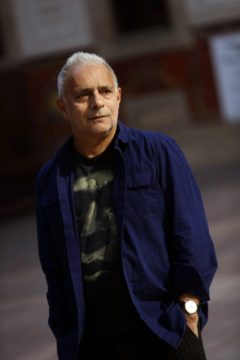Sarah Lyall in The New York Times:
 Just after Christmas, the writer Hanif Kureishi was taking a long walk in Rome, where he and his wife, Isabella D’Amico, were spending the holiday, when he suddenly collapsed onto the sidewalk. It is unclear why — perhaps he fainted, said his son Carlo Kureishi, or perhaps he suffered an epileptic fit — but he fell awkwardly, twisting his neck and grievously injuring the top of his spine. When Kureishi regained his senses, he was lying in a pool of blood, unable to move his arms or his legs. “It occurred to me that there was no coordination between what was left of my mind and what remained of my body,” he wrote, via dictation, a few days later on Twitter. “I had become divorced from myself. I believed I was dying. I believed I had three breaths left.”
Just after Christmas, the writer Hanif Kureishi was taking a long walk in Rome, where he and his wife, Isabella D’Amico, were spending the holiday, when he suddenly collapsed onto the sidewalk. It is unclear why — perhaps he fainted, said his son Carlo Kureishi, or perhaps he suffered an epileptic fit — but he fell awkwardly, twisting his neck and grievously injuring the top of his spine. When Kureishi regained his senses, he was lying in a pool of blood, unable to move his arms or his legs. “It occurred to me that there was no coordination between what was left of my mind and what remained of my body,” he wrote, via dictation, a few days later on Twitter. “I had become divorced from myself. I believed I was dying. I believed I had three breaths left.”
Taken to the Gemelli Hospital, Kureishi spent the next several days “profoundly traumatized, altered and unrecognizable to myself,” he said on Twitter. “At the moment, it is unclear whether I will ever be able to walk again, or whether I’ll ever be able to hold a pen.” Since then, Kureishi, 68, a novelist, screenwriter, playwright and director best known for “My Beautiful Laundrette” and “The Buddha of Suburbia,” has been dictating daily dispatches from his hospital bed. In vivid, poignant prose, he is narrating his ongoing drama but also conjuring past memories, musing about writing and art and describing the terrifying, sometimes transcendent profundity of being dependent on the love and patience of others.
More here.
